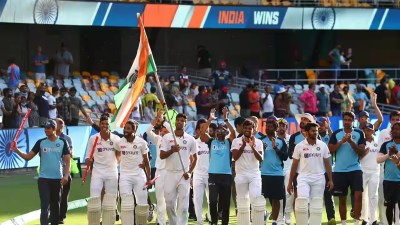Please Clear the Following
IF you thought a war of words between the treasury and the Opposition benches in Parliament resulted in loss of face for the government, thi...

IF you thought a war of words between the treasury and the Opposition benches in Parliament resulted in loss of face for the government, think again. The only casualty in this tussle is the conduct of the business that is the primary function of Parliament: legislation.
With Parliment paralysed for three consecutive sessions 8212; the Budget session on account of Godhra, the summer session on account of the Gujarat riots and the monsoon session on account of the petrol pump scam 8212; 43 Bills from the government and 269 Private Members8217; Bills are currently waiting for clearance.
Among them are very important legislations that could have serious implications on the economy, currently going through its lowest phase in a decade. Also waiting are Bills like the Lokpal Bill, dealing with corruption in high public offices. Official records show it has been pending since August 2001, but actually, it has been around in Parliament in one form or the other since 1969!
|
PENDING IN PARLIAMENT 2. The Central Vigilance Commission Bill: aims at 3. The Essential Commodities Amendment Bill: aims at free movement of foodgrains currently restricted for intra-state movement 4. The Freedom of Information Bill: aims at making government functioning more transparent Story continues below this ad 5. The Banking Companies Acquisition and Transfer of Undertakings and Financial Institutions Laws Amendment Bill: Aims at reducing government equity in nationalised banks to 33 per cent 6. The Fiscal Responsibility and Budget Management Bill: aims at tackling the 7. The Competition Bill: aims at freeing courts from inter-corporate disputes on issues relating mainly to doing business 8. The Lokpal Bill: aims at fixing responsibility and rooting out corruption from high public offices Story continues below this ad 9.The Sick Industrial Companies Special Provisions Repeal Bill 10. The Electricity Bill: aims at power sector reforms making it attractive for private participation in power generation 11. The Communication Convergence Bill: aims at a single licence for all IT/telecom and cable licences 12. The Petroleum Regulatory Board Bill: aims at setting up a petro regulator to oversee competition issues in the oil sector Story continues below this ad 13. The Securitisation and Reconstruction of Financial Assets and Enforcement of Security of Interest Bill: aims at reducing the NPAs of nationalised banks which is in the region of Rs 70,000 crore 14. The Prevention of Money Laundering Bill, as returned by RS: aims at diluting the draconian FERA act reducing harassment from govt on this account |
Then there8217;s the Right to Information Bill, of similar vintage, and the much-hyped Election Laws Amendment Bill, which aims at initiating electoral reforms and cleansing the political system.
While some of these Bills, experts say, could trigger major debate and take time to iron out, the delays in the passage of economic bills defy all logic. Eight of the 43 pending bills relate to legislations the Ministry of Finance needs to boost economic activity and impose financial discipline. These Bills could have a far-reaching impact on the growth of the Indian economy and its global competitiveness.
Top among them is the the Fiscal Responsibility and Budget Management Bill, which was introduced in Lok Sabha on December 20, 2000. The Bill was fashioned to impose some discipline on government spending so as to keep the fiscal deficit in check. Government downsizing, restrictions in expenditure 8216;8216;by the mantris and their santris8217;8217; 8212; as it is popularly referred to 8212; will all become serious business only after this Bill is passed.
The most important Bill, essential for financial reforms in the corporate sector, is the Securitisation and Reconstruction of Financial Assets and Enforcement of Security Interest Bill, which aims at empowering banks to recover loans given to large and small industrial houses that have become bad debts or non-performing assets.
Taken together, the nationalised banks account for close to Rs 70,000 crore in loans 8212; given to some of the biggest industrial houses in the country 8212; that have not been repaid. The Bill was introduced on July 19 this year. Though an Ordinance is currently in force, it is imperative that the Bill be passed before the Ordinance lapses.
Then there8217;s the Banking Companies Acquisition and Transfer of Undertakings and Financial Institutions Laws Amendments Bill, introduced on December 13, 2000, that looks at banking reforms and cuts government equity in nationalised banks from 100 per cent to 33 per cent.
Other important financial Bills awaiting Parliament8217;s nod are the Financial Companies Regulation Bill, which has been pending since December 2000; the Sick Industrial Companies Special Provisions Repeal Bill, pending since August 2001; the Negotiable Instruments Amendment and Miscellaneous Provisions Bill, introduced in July 2002 and Prevention of Money Laundering Bill, introduced in December 1999.
The Electricity Bill is another important Bill that has a crucial role in initiating power sector reforms in the country. It proposes streamlining the working of the financially beleaguered State Electricity Boards, stumbling blocks to private investment in power generation and all consumer and industry hope for power sufficiency in the near future.
The Communication Convergence legislation is supposed to replace the TRAI Act 1997, but no one, except the Ministry of Communications, seems to want it. The Bill has been opposed unequivocally by the industry and consumers, who have labelled it ambitious, but retrograde, even when compared to the current legislation. Multiple presentations have been made outlining specific section-by-section deficiencies in the Bill to the Parliamentary Committee headed by Somnath Chatterjee.
The Bill, according to industry experts and consumer bodies, is vague, leaving too much discretionary power in the hands of the proposed Commission. The bill is specifically inadequate while dealing with issues of competition and abuse of market power, interconnection and access norms, conflict of interest, process of migration to convergent licenses, transparency in selection of members and principles in allocation of scarce resources etc. The Bill was first introduced in August 2001.
The Competition Bill is yet another important piece of legislation that is hanging fire. It could improve fair competition and also reduce the load of litigation. It has been put together by a distinguished set of experts and is well defined in its scope and content. However, it has some crucial shortfalls under which the government can exempt any class of enterprise from the provisions of the proposed legislation citing, amongst others, public interest as a reason.
Also, the Bill allows the government freedom to issue directions on the question of policy. This, points out the corporate world, undermines the very purpose of the Bill.
The Petroleum Regulatory Board Bill deals with the establishment of an independent regulator, which will ensure that prices and competition issues are resolved independent of government intervention after the private sector becomes a player in the oil sector.
Equally significant are Bills like the ones for the Protection from Domestic Violence 8212; introduced in March this year 8212; Prevention of Food Adulteration, Medical Termination of Pregnancy Amendment and the Essential Commodities Amendment, which will lift the ban on inter-state movement of grains in favour of free movement.
With such important Bills hanging fire, the members8217; oft-repeated excuse that all Bills require debate as 8216;8216;the future of the country and its millions are at stake8217;8217;, has to be taken with a pinch of salt.
After all, the Information Technology Bill became an Act with a couple of hours8217; debate each in the Rajya Sabha and the Lok Sabha. And the 2002 Budget, which covers 100 crore people for a whole year, was passed without any debate whatsoever amid the din over the Gujarat affair.
| Government vs Opposition: And the Blame Game Goes On |
|
SOMNATH CHATTERJEE 8216;8216;It is the duty of the government and the treasury benches to run Parliament and get business transacted. Nowadays, we often see members of the ruling coalition disrupting proceedings. The Prime Minister does not bother to come to the House, even when important issues are being raised. Contrary to popular perception, it suits us if the business of the House is run properly and we get to expose this corrupt government.8217;8217; AMBIKA SONI 8216;8216;It is not just the duty of the Opposition to ensure the functioning of Parliament. So far as pending Bills are concerned, it is the government8217;s responsibility to set dates for discussions on the Bills and ensure that debates are held in the House. We want constructive debates and answers from the government.8217;8217; PRIYA RAJAN DASMUNSHI 8216;8216;In a democracy, disruption of stalling of House proceedings is established parliamentary norms. It is the Opposition8217;s duty to get government responses on issues that touch the lives of the people. In the petrol pump scam, for instance, the PM did not come to the House and decided to cancel the allotments, which was legally untenable. Records show that Parliament was stalled for 28, 38 and 18 days respectively over the Maruti issue, the telecom licensing scam and the Bofors issue. It is because of the consistent opposition that the government ordered inquiries.8217;8217; VIJAY KUMAR MALHOTRA 8216;8216;The Opposition is not interested in having its say, they want to have their way by stalling the House. We have told the Opposition: Let the government transact business two days a week and they can have two days to discuss/debate whatever they want. Plus, there8217;s one day for private members8217; Bills. Earlier, only one day used to be marked for non-official business. Now the opposition wants shor-saraba on a daily basis.8217;8217; NILOTPAL BASU 8216;8216;This government is so over-sensitive to criticism it would prefer that the House not function, instead of facing it squarely. Where is the government8217;s accountability? How do we ensure it? We will strive hard to do business. But the government has to take Parliament into confidence.8217;8217; 8212; Santwana Bhattacharya |
- 01
- 02
- 03
- 04
- 05































